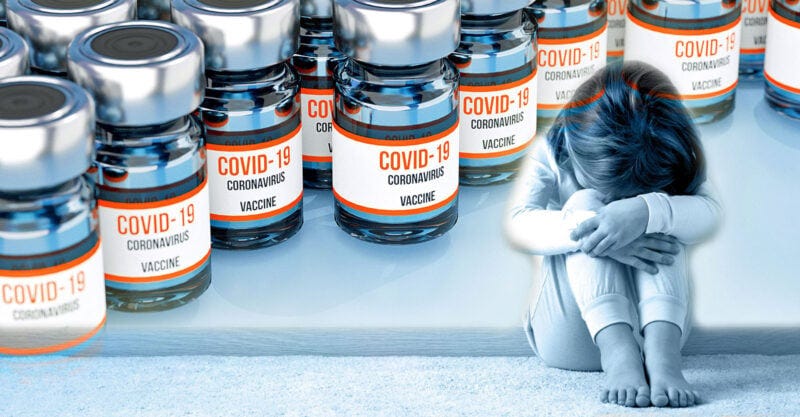Child Deaths in VAERS - much higher than reported - 538 children died after taking a COVID-19 Vaccine - documented in VAERS, but many deaths are cleverly hidden!
NEWS (June 12, 2024): Number of Children Who Died After COVID Shots Much Higher Than VAERS Reports Indicate, Analyst Says
Many VAERS reports list “age unknown” for people who were injured or died following a COVID-19 vaccine. VAERS analyst Albert Benavides said a closer look at the report summaries often reveals the victim’s age — yet VAERS doesn’t update the reports to reflect this. If it did, the number of child death reports after the vaccine would be much higher.
Fetal deaths and miscarriages, sudden cardiac arrest, sudden death and suicides — these are some of the causes of death listed in reports submitted to the Vaccine Adverse Event Reporting System (VAERS) on children who received a COVID-19 vaccine.
Yet, these reports do not count toward the total number of child deaths listed in VAERS data because the victims’ ages are officially listed as “unknown,” according to VAERS analyst Albert Benavides.
Benavides reviewed the data for his website, VAERSAware.com, and provided links to many of these “unknown age” child death reports on his site.
VAERS data as of May 31 lists 197 child deaths following COVID-19 vaccination.
However, Benavides told The Defender, “There are approximately 418 properly documented deaths in children below age 18. There are an additional approximate 120 kid deaths where the summary narrative states ‘child, infant, neonate, baby.’”
Benavides identified these “unknown age” reports using an algorithm and “manual intervention.”
Benavides said his findings indicate “the current total is about 538” child deaths.
He said undercounting is not unusual for VAERS, noting that his research shows that “30% of all COVID-19 reports in VAERS have an ‘unknown age.’”
“There seems to be at least one hidden kid death in every VAERS update,” Benavides said.
A 2011 Harvard report found that less than 1% of all adverse events are reported to VAERS — but Benavides said child deaths appear to be concealed at a higher than average rate compared to reports of adult deaths.
According to a paper by Benavides and evolutionary biologist Herve Seligmann, Ph.D., child reports have more missing ages in the VAERS age field by proportion or percentage compared to older cohorts.
“Seligmann analyzed the missing age fields with properly documented summary narratives and has quantified that the younger age cohorts have a higher propensity for missing age than the adults,” Benavides said.
“These missing ages do not seem organic, especially for the children.” Benavides added that they are, “dare I say, hidden.”
Benavides suggested the Centers for Disease Control and Prevention (CDC) and the U.S. Food and Drug Administration (FDA), which administrate VAERS, are obfuscating the true death figures for vaccinated children. He said:
“If the age is properly documented in the summary narrative, why wouldn’t a managerial decision be made to ethically update an empty age field and correct the submitter’s oversight?
“It is my expert opinion as a former HMO claims auditor, proper age may have been populated in the age field upon submission, but in the minutiae of the adjudication process, the age field data element was deleted or disappeared.”
‘I have a dead 6 years old in my arms’
The “unknown age” reports Benavides identified suggest numerous miscarriages, fetal deaths and deaths of babies. There are also several reports of children who died due to myocarditis or cardiac arrest, or who died suddenly.
Other reports pertain to child athletes who died or children who died after vaccination at school.
The Defender reviewed a sample of the “unknown age” child death reports in VAERS. “I have a dead 6 years old in my arms; Vaccine doesn’t work,” reads one report.
In some instances, newborn babies and young children died.
A 12-day-old baby of unspecified gender from outside the U.S. died on March 9, 2022. The baby’s 36-year-old mother had received a dose of the Pfizer-BioNTech vaccine on June 9, 2021, during her first trimester of pregnancy. According to the report, “Baby born and passed away on 09Mar2022 from cardiomyopathy. No family history of heart conditions. All three vaccines received during pregnancy.”
A 5-month-old boy received his first dose of the Pfizer-BioNTech vaccine on April 17, 2021, and died on May 2, 2021.
A 2-year-old girl received her second dose of the Pfizer-BioNTech vaccine on Feb. 25, 2021. On March 1, 2021, “the patient experienced suffered some kind of serious adverse reaction. The VAERS report does indicate that the child had been hospitalized since February 14, which suggests she may have gotten sick from first shot. Despite this, someone administered a second shot to the already sick and suffering child, which caused her [to] die” on March 3, 2021.
A Texas woman of unspecified age received her first dose of the Moderna vaccine on Jan. 31, 2022. According to the report, she “experienced diarrhea, leaking amniotic fluids and vaginal bleeding the same day after first dose.” Subsequently, “The mother was diagnosed with Acute cystitis with hematuria and premature rupture of membranes. Five days later, she had contractions, went to the emergency room and had a premature delivery.” The baby died.
Several children also died of heart conditions:
A 5-year-old boy from outside the U.S. received his first dose of the Pfizer-BioNTech vaccine on April 26, 2022. He experienced abdominal pain and died of cardiac arrest three days later.
A 6-year-old boy from outside the U.S. received his first dose of the Pfizer-BioNTech vaccine on Jan. 8, 2022. He died on Jan. 15, 2022, of myocarditis and cardio-respiratory arrest.
An 11-year-old boy from outside the U.S. received his first dose of the Pfizer-BioNTech vaccine on Dec. 15, 2021. He died five days later of “acute respiratory failure, irritability, brain malformation, cardiac arrest, diarrhoea.”
A 13-year-old boy died three days after receiving his second dose of the Pfizer-BioNTech vaccine. According to the report, “Autopsy showed enlarged heart and fluid surrounding the heart.”
A 15-year-old boy from outside the U.S. received his second dose of the Pfizer-BioNTech vaccine on Nov. 24, 2021, and died the next day. According to the report, “The boy suffered chest pains shortly after returning home from a vaccination centre.” Yet, “Doctors said the boy died as a result of diabetes.”
A 16-year-old girl from outside the U.S. received her first dose of the Pfizer-BioNTech vaccine on Nov. 10, 2021. She died of “Brain damage resulting from acute heart failure and decompensation and hypoxia on 18Dec2021.”
A 16-year-old girl from outside the U.S. received a Pfizer COVID-19 booster on Dec. 27, 2021. Two days later, she died of “Pulmonary artery embolism with cardiac arrest.”
A 17-year-old boy from outside the U.S. had received a dose of the Pfizer-BioNTech vaccine “a few days” before he passed away. According to the report, “at the time of death D-dimer test result was elevated.”
A 17-year-old girl from outside the U.S. received her first dose of the Pfizer-BioNTech vaccine on Aug. 30, 2021. On Sept. 9, 2021, “the patient experienced cardiac arrest and died.” Yet, her death was attributed to “Oral Contraceptives that have been started in July 2021” while “A vaccine aetiology was not considered.”
A 17-year-old boy from outside the U.S. received a Pfizer booster on June 16, 2022, at his school. He “experienced generalized weakness and poor appetite in Jun2022, convulsion and out-of-hospital cardiac arrest … on 12Aug2022, elevated cardiac enzymes and suspected myocarditis on 13Aug2022” and was hospitalized. According to the report, he signed a DNR (do not resuscitate) order on Aug. 18, 2022, and died the next day. It is unclear whether it was legal for him to sign a DNR at his age in his jurisdiction.
Reports involving fetal deaths and stillbirths:
A 31-year-old woman from outside the U.S. received her first dose of the Pfizer-BioNTech vaccine in September 2021, during her second trimester of pregnancy. According to the report, her pregnancy was later aborted on an unspecified date due to “foetal cardiac arrest.”
A 33-year-old woman from outside the U.S. received her first dose of the Pfizer-BioNTech vaccine in June 2021. According to the report, “The mother had legal termination of pregnancy performed on 04Sep2021 for severe malformations … fetal outcome is congenital anomaly.”
A 34-year-old South Carolina woman received her first dose of the Pfizer-BioNTech vaccine in October 2021, during the first trimester of her pregnancy. According to the report, “at an ultrasound at 8 weeks 4 days the baby was measuring small (about 7 weeks) and had a lower heart rate, at an ultrasound at 10 weeks the baby measured 7 weeks and 1 day with no heartbeat, resulting in a miscarriage.”
A 35-year-old Massachusetts woman received her second dose of the Pfizer-BioNTech in April 2021. According to the report, “Baby stopped growing 5 days after shot,” leading to a miscarriage.
A 36-year-old woman from outside the U.S. received her second dose of the Pfizer-BioNTech vaccine on June 17, 2021, in her eighth week of pregnancy. According to the report, “Discovery of a heart defect in a fetus which led to its death.”
A Texas woman of unspecified age received her second dose of the Moderna COVID-19 vaccine on Sept. 22, 2021. According to the report, “clotting at the placenta/caused the baby to not receive any blood; Baby was deceased on: 26Oct2021.” Yet, “The benefit-risk relationship of mRNA-1273 is not affected by this report.”
A Texas woman of unspecified age received her first dose of the Pfizer-BioNTech vaccine on Feb. 4, 2021. According to the report, “Per ultrasound on 20Feb2021, fetus stopped growing on 09Feb2021 (8 weeks 4 days); no heartbeat detected. Miscarriage occurred on 22Feb2021.”
A foreign woman of unspecified age received her second dose of the Moderna vaccine on Oct. 18, 2021. According to the report, stillbirth “occurred approximately 30 days after the mother received the second dose.”
A foreign woman of unspecified age who was in her 40th week of pregnancy received a dose of the Pfizer-BioNTech vaccine on an unspecified date. According to the report, “the next day the fetus died.”
Other incidents listed with an “unknown age” included a woman who experienced a growth in her ovaries, the death of a 14-year-old girl with Guillain-Barré syndrome, a 12-year-old girl who experienced “sudden death,” a 14-year-old girl found “dead in bed,” a 12-year-old girl who hung herself on the same day as her vaccination and a 17-year-old boy who committed suicide two days after vaccination.
At least three reports of student-athletes who died are also included among the VAERS “unknown age” reports, including an “always healthy” 13-year-old boy, a 16-year-old boy who died with “an abnormally large heart” and a 13-year-old boy who experienced “foaming at the mouth” and myocarditis.
In other cases, children died after receiving a COVID-19 vaccine despite being part of an age group that was not authorized at the time to receive the vaccine.
In another case, an adolescent girl from outside the U.S. sustained “side effects” after her first Pfizer-BioNTech dose in December 2021, but despite her mother’s concerns, health workers “asked her to get the second shot anyway.” She received her second dose on Jan. 17, 2022, and died the next day after falling into a coma.
Though a “regulatory authority” reported the incident to VAERS, the report notes, “No follow-up attempts are possible.” Several other reports were also apparently submitted by official bodies, yet VAERS claims follow-ups are impossible.
“Non-contactable seems disingenuous and a breach of some kind of ethics,” Benavides said. “Surely between the FDA, the CDC and the manufacturer, they could find the hospital or institution.”
Several other “unknown age” reports captured by Benavides have been subsequently deleted from VAERS or their written summaries have been removed.
Some of these are foreign reports for which the European Medicines Authority and the U.K. Medicines and Healthcare products Regulatory Agency asked for the data to be removed due to non-compliance with European privacy laws, Benavides said.
Yet, for Benavides, “This amount of deletions is simply too high and undesirable for the supposed best pharmacovigilance system in the world with a very reasonable 4-6 week adjudication process.”
Michael Nevradakis, Ph.D.
Michael Nevradakis, Ph.D., based in Athens, Greece, is a senior reporter for The Defender and part of the rotation of hosts for CHD.TV's "Good Morning CHD."
My Take…
Keep reading with a 7-day free trial
Subscribe to COVID Intel - by Dr.William Makis to keep reading this post and get 7 days of free access to the full post archives.








